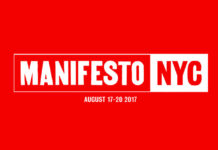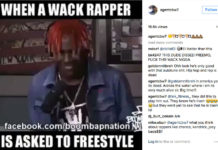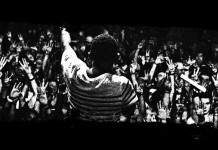JuJu and Psycho Les sat on stage at the Ohio Theater and appeared as relaxed as ever. “How is the energy different?” was the question from Clyde Valentin, Executive Director of the 9th annual NYC Hip-Hop Theater Festival, during a Q&A session held at the end of their latest performance. Juju replied calmly, “We’re used to motherfuckers getting up when we do shows…” Psycho Les cuts in almost on cue: “…mosh pits everywhere. It’s a different energy, but it’s a different thing. We doing the theater thing, so it’s cool.”
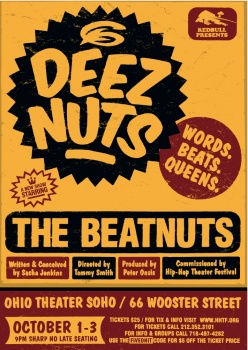 And with that, The Beatnuts’ JuJu and Psycho Les can now add theater to their impressive resume of production and musical work. Their new venture is called Deez Nuts, a workshop production produced by Peter Oasis and directed by Tommy Smith, blending live musical performances and autobiographical narratives based on their their lives growing up in Corona, Queens, and their musical journey. The play, which debuted at the Festival, was written by hip-hop journalist and Ego Trip magazine founder Sacha Jenkins, and explores the history of how JuJu and Psycho Les evolved into the world-famous Beatnuts.
And with that, The Beatnuts’ JuJu and Psycho Les can now add theater to their impressive resume of production and musical work. Their new venture is called Deez Nuts, a workshop production produced by Peter Oasis and directed by Tommy Smith, blending live musical performances and autobiographical narratives based on their their lives growing up in Corona, Queens, and their musical journey. The play, which debuted at the Festival, was written by hip-hop journalist and Ego Trip magazine founder Sacha Jenkins, and explores the history of how JuJu and Psycho Les evolved into the world-famous Beatnuts.
Sacha Jenkins grew up in Astoria, attending Bryant High School in Long Island City with Psycho Les. He knew JuJu through mutual friends in the music industry. The acclaimed duo inspired him to write something that would bring their story to life. Jenkins explains, “There’s something about their references, their languages, the things that they talk about and some of the things they have in common with me.” Jenkins hails from Haiti while Juju and Psycho Les hail from the Dominican Republic and Colombia, respectively, and Jenkins was very interested in bringing a Latino-Caribbean flavor to the theater, something not found in abundance, especially in this type of forum.
“The Beatnuts were pioneers. A lot of their achievements were partially overlooked because they were Latino,” Jenkins theorizes. “Marketing has always been a big part of the hip hop machine, or at least the corporate machine, but their marketing wasn’t so great and they got lost in the sauce. I figured that a play that could bring their story to life would be something people would want to see, along with hearing good music.”
When first approached about doing a play, both JuJu and Les initially expressed reservations, but decided that they wanted to do the production as long as it was done ‘right’. Jenkins explains, “They were somewhat skeptical, because it’s something that’s not very common. Not many rappers have plays.”
“I was with it,” said Les, “I just wanted to know, ‘What kind of play?’ and ‘Is it still gonna represent us?’”
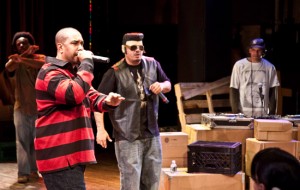 Juju was also worried about being portrayed in the wrong light. “I’m not really a thespian and shit, so I really wasn’t too into doing it, but then Les talked to me and then Sacha and Peter kind of convinced me. It is a cool idea and they telling me that it’s the future: hip-hop theater. It’s always cool to be in the forefront of something.”
Juju was also worried about being portrayed in the wrong light. “I’m not really a thespian and shit, so I really wasn’t too into doing it, but then Les talked to me and then Sacha and Peter kind of convinced me. It is a cool idea and they telling me that it’s the future: hip-hop theater. It’s always cool to be in the forefront of something.”
The play features some of The Beatnuts’ greatest cuts, including: Reign of the Tec, No Escapin’ This, Turn it Out, Supa Supreme, Off the Books, Se Acabo, and Watch Out Now. Track selection was a collaborative effort. “We all got together and picked songs that really meant a lot to us,” explains Les. Jenkins was pleased with the songs The Beatnuts selected, and was very proud of the entire production. “What I really wanted to happen has happened, a really strong connection between the performers and the audience. There’s a lot of call and response, everyone knows the lyrics,” he said. Then, reflecting, he adds, “There a lot of personal stories that not only get at the heart of the origins of The Beatnuts, but at the heart of the origins of people in these communities. And it’s told in a very honest, unhinged, uncensored way. I think non-traditional and traditional theater audiences will find this show entertaining.”
The production, which started taking shape in early 2009 remains in constant flux. Deez Nuts is a workshop production, and as Jenkins admits, “all the bells and whistles aren’t here yet.” Yet, he is looking forward to taking this story to new heights and to entertaining even more audiences as there are talks of bringing Deez Nuts to the DC leg of the festival in 2010. Jenkins also had high praise for director Tommy Smith. “Tommy was great. I had never done this before and he really worked with me in terms of figuring out the structure, and I was able to plug in where things could work.”
The show ran for three night, playing to a full house on each occasion, and feedback was extremely positive. For all the skepticism JuJu and Les had prior to signing on to perform these shows, they have been humbled by the positive messages they have received. “A lot of people have been hitting me up, the people that did come, talking about ‘that it was amazing’. They were blown by the way me and Les get down and shit,” JuJu explained. “Then Peter Oasis last night showed me a couple of Twitter hits where motherfuckers were like ‘Damn, that nigga JuJu really got verses. I slept on that nigga,’ so I guess it’s a good thing.”
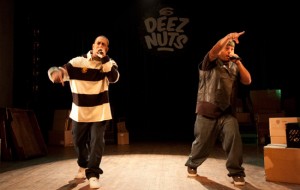 Ultimately, Juju wants people to come away with a new experience and get a little history on what The Beatnuts are like. “I just want them to enjoy themselves and see us in the rare form that they never seen us in before.”
Ultimately, Juju wants people to come away with a new experience and get a little history on what The Beatnuts are like. “I just want them to enjoy themselves and see us in the rare form that they never seen us in before.”
Les added that he wanted people to have a really good time, reminisce on some good Beatnuts music and get ready for future projects. “That’s always been our thing too, to just do sneak attacks. Come with some crazy shit out of nowhere. And this, [Deez Nuts], just crept up on people and was all of a sudden. We’re used to being on stage and dealing with people and crowds and making them laugh and giving them a good time, so this shit now is just with dialogue a little bit.”
It’s the kind of production that led Clyde Valentin to become involved in The NYC Hip-Hop Theater Festival, falling in line with his intense passions for storytelling, hip-hop culture, and theater. Valentin believes in bringing top shelf entertainment to the hip-hop generation. “Theater is one of the most powerful art mediums that we can experience. Unfortunately, it tends to be a very elitist kind of environment, so our mission is to really tell the stories that are by, for, and about the hip-hop generation in this context. That’s pretty much what got me into it.”
Valentin is already at work on next year’s festival which promises to be an even bigger event, since the festival grows by leaps and bounds every year, benefiting from the strong word of mouth advertising from people who attend the festival and then return with friends.
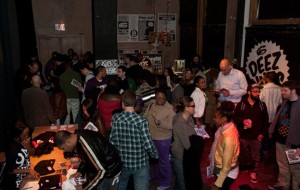 “Feedback is always good. Usually, when people walk into the room for the first time, they don’t know what to expect and they walk out as fans. Or at the very least, interested at what may come next. Non-traditional theater people, hip-hop generation cats that don’t go to theater end up really digging what they see, because it speaks to them.”
“Feedback is always good. Usually, when people walk into the room for the first time, they don’t know what to expect and they walk out as fans. Or at the very least, interested at what may come next. Non-traditional theater people, hip-hop generation cats that don’t go to theater end up really digging what they see, because it speaks to them.”
This groundbreaking festival has given Jenkins, also an experienced television producer, an opportunity to tell a story in a different medium, something which he is grateful for. “For someone like me who never really envisioned something like this and to be a person of color, to be able to have this kind of opportunity to tell these kinds of stories in this very non-people-of-color kind of world, with the politics of theater, etc., is great. The festival is a brilliant opportunity for a lot of people to tell lots of compelling stories that you don’t get to hear elsewhere, people that are just proud to see a representation of themselves being given this kind of respect and this kind of treatment. I think hip-hop has been around long enough to receive this kind of respect and to highlight hip-hop in this kind of forum. It’s about time.”
All photos by Michael Premo
The 2009 Hip-Hop Theater Festival runs through Oct. 17, 2009
no images were found
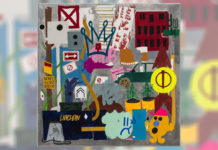
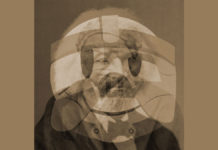
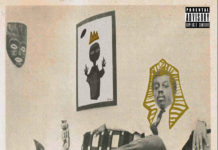
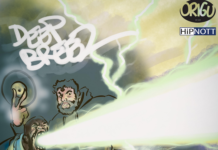

![The Underachievers – Crescendo [VIDEO]](https://www.birthplacemag.com/wp-content/uploads/2017/08/hqdefault-2-218x150.jpg)


![Fat Joe & Remy Ma ft. The-Dream – Heartbreak [VIDEO] Fat Joe Remy Ma The Dream - Heartbreak Video](https://www.birthplacemag.com/wp-content/uploads/2017/05/fat-joe-remy-ma-218x150.jpg)
![JSWISS featuring Chandanie – LML [VIDEO] JSWISS featuring Chandanie - LML [VIDEO]](https://www.birthplacemag.com/wp-content/uploads/2017/05/JSWISS-218x150.jpg)

![Akinyemi Ends Summer With “Summers” EP Release Show [9-17-17] Akinyemi 'Summers' EP release show at Brooklyn Bazaar](https://www.birthplacemag.com/wp-content/uploads/2017/09/summers-featured-218x150.jpg)
![4th Annual NYC VS EVERYBODY Yacht Party [9/16/17] #VSYacht 4th annual NYC VS Everybody Yacht Party#VSYacht](https://www.birthplacemag.com/wp-content/uploads/2017/09/vsyacht-218x150.jpg)
